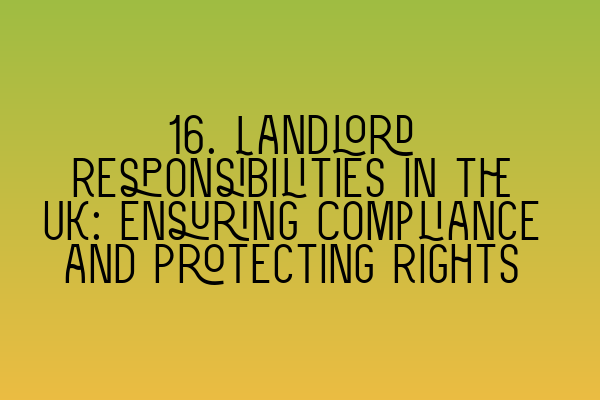16. Landlord Responsibilities in the UK: Ensuring Compliance and Protecting Rights
As a landlord in the UK, there are certain responsibilities and obligations that you must adhere to in order to ensure compliance with the law and protect the rights of both yourself and your tenants. Understanding these responsibilities is crucial for maintaining a successful and legally sound landlord-tenant relationship. In this article, we will explore 16 key landlord responsibilities in the UK and provide valuable insights into how you can fulfill them effectively.
1. Provide a Safe and Habitable Property:
Ensuring that your rental property is safe and habitable is one of your primary responsibilities as a landlord. This includes addressing any structural issues, maintaining essential utilities such as heating and plumbing, and ensuring that the property is free from hazards.
2. Adhere to Health and Safety Regulations:
You must comply with health and safety regulations to protect both your tenants and yourself. Conduct regular checks for fire safety, ensure the presence and functionality of smoke alarms and carbon monoxide detectors, and provide essential safety equipment such as fire extinguishers.
3. Conduct Regular Property Inspections:
Regular property inspections allow you to identify any maintenance issues and ensure that your property is being well-maintained by your tenants. It is important to respect your tenant’s privacy and provide reasonable notice before conducting any inspections.
4. Protect Tenant Deposits:
If you require a tenancy deposit, it is your responsibility to protect it in a government-approved deposit protection scheme. Failure to do so can have serious legal consequences and may result in financial penalties.
5. Provide Proper Documentation:
You must provide your tenants with a written tenancy agreement that outlines the key terms of the tenancy, such as the duration, rent amount, and the responsibilities of both parties. It is important to ensure that the agreement is fair, clear, and legally compliant.
6. Perform Repairs and Maintenance:
As a landlord, you are responsible for addressing any necessary repairs and maintenance in a timely manner. This includes fixing any structural issues, plumbing or electrical problems, or any other issues that may affect the habitability of the property.
7. Arrange Gas Safety Certificates:
If your property has gas appliances, it is a legal requirement to arrange an annual Gas Safety Certificate. This certifies that all gas appliances, fittings, and flues are safe to use and comply with the necessary regulations.
8. Uphold Fire Safety Standards:
Installing and maintaining fire safety measures is crucial. This includes making sure that your property has adequate fire exits, fire alarms, and fire extinguishers, as well as regularly testing and maintaining these systems.
9. Provide Energy Performance Certificates (EPCs):
An Energy Performance Certificate (EPC) is a legal requirement when renting out a property. It provides information about the energy efficiency of the property and recommendations for improving its energy performance.
10. Handle Pest Infestations:
If your property becomes infested with pests, it is your responsibility to address the issue promptly. This may involve arranging professional pest control services to eliminate the infestation and prevent further problems.
11. Respect Tenant Privacy:
Respecting your tenant’s privacy is essential. You must give appropriate notice before accessing the property for any reason, except in cases of emergency. Generally, 24 hours’ notice is required, unless it’s an urgent matter.
12. Ensure Adequate Waste Disposal:
Ensuring that your property has proper waste disposal arrangements is essential. Tenants should have access to appropriate waste bins and should be informed about the local waste disposal procedures.
13. Manage Anti-Social Behavior:
As a landlord, you have a responsibility to address any complaints of anti-social behavior by your tenants. This may include taking appropriate actions to resolve the issue and ensure the peaceful enjoyment of neighboring properties.
14. Comply with EPC Minimum Standards:
Since April 1, 2018, it has been a legal requirement for rental properties to meet a minimum energy efficiency rating (EPC rating of E or above). If your property falls below this standard, you must take appropriate measures to improve its energy efficiency.
15. Arrange Building Insurance:
Having adequate building insurance is crucial as it helps protect your property from unexpected events such as fire, flood, or structural damage. It is your responsibility to arrange and maintain appropriate insurance coverage for your rental property.
16. Stay Informed about Changing Laws and Regulations:
Landlord responsibilities and laws can change over time. It is important to stay informed about any amendments or new regulations that may affect your obligations as a landlord. Regularly reviewing landlord guidance and seeking legal advice when necessary can help you stay compliant with the law.
In conclusion, being a responsible landlord in the UK entails fulfilling a variety of responsibilities to ensure compliance with the law and protect the rights of your tenants. By providing a safe and habitable property, attending to necessary repairs and maintenance, adhering to safety regulations, and respecting your tenants’ rights, you can establish a positive and legally sound relationship with your tenants. Remember to stay informed about the evolving legal landscape and seek professional advice when needed.
If you found this article helpful, you may be interested in other related articles:
– SQE 1 Practice Exam Questions
– SQE 1 Practice Mocks FLK1 FLK2
– SQE 2 Preparation Courses
– SQE 1 Preparation Courses
– SRA SQE Exam Dates
At SQE Property Law & Land Law, we provide comprehensive legal services to landlords, tenants, and individuals in the property sector. Our team of expert solicitors is here to guide you through the complexities of property law and ensure that you remain compliant with all legal obligations. Contact us today to learn more about how we can assist you with your property law needs.
Disclaimer: This article is for informational purposes only and should not be considered legal advice. It is always recommended to consult with a qualified solicitor for advice specific to your situation.
